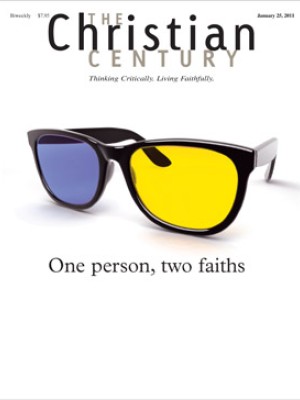Now it’s personal: Reclaiming a relationship with Jesus

"Do you have a personal relationship with Jesus?" Aunt Phoebe's question—for her it was a question about my salvation—made me cringe as a girl. When my siblings and I heard Great Aunt Phoebe's '55 Chevy Bel Air purr up the driveway, we hightailed it for the creek out behind the back forty. When I asked my mother years later why she let us get away with that, she chuckled and said on the whole she thought it was the healthier alternative. I vowed never to ask anyone Aunt Phoebe's question. It is a vow I have kept.
Lately, however, I have been revisiting the notion of having a personal relationship with Jesus.
It all began one warm spring afternoon as I was working with a group of women pastors in a Bible study that we had been calling "Luke's quest stories," a phrase used by Robert Tannehill. They are a cycle of stories in which someone approaches Jesus regarding a quest for something vitally important to human well-being. There are obstacles in the way of the quest, sometimes physical, sometimes social, psychological or spiritual. The obstacles are overcome, or not. The quest is fulfilled, or not. The stories are simple stories that many of us have known all our lives: the paralytic, the centurion with a sick slave, the woman of the city, Mary and Martha, the lepers, Zacchaeus, the rich ruler, the thieves on their crosses with Jesus, the women at the tomb. But the stories' simplicity is deceptive. The more deeply one looks at them, the more complex they seem. There is often more than one quest and sometimes more than one quester. Sometimes the quest presented is not the quest completed.
Read our latest issue or browse back issues.
Our study was born out of a haunting refrain I had heard over the years from students in my exegesis classes about how to continue life-giving study into the pastorate. We had also received a Lilly grant, so we could afford to explore some dreams. We met one afternoon a month in a retreat setting—15 women pastors, myself and a colleague who led us in worship. We had a straightforward format. I sent the pastors my translation of one of the quest stories in advance, along with some "starter" questions. When we met we began with a prayer and then read the text together, taking the parts in the manner of reader's theater.
For the first hour we noted our observations and questions about the text. The ground rule was that we accepted each comment, whatever amount of preparation lay behind it, trusting the group to sift through the contributions and decide where to linger, what to probe and what to release. We probed deeply and I led gently—answering questions if asked, clarifying points of translation if necessary but mainly letting the group find its way into the story. As the year went by, we called what we were doing "mucking around in Luke."
The second hour, after a break for tea and scones (which was very important), we laid the text next to our experience: What does this quest story have to do with my life and my ministry? Where am I in this story today? How is this text calling me? We divided into two groups for that discussion, and the conversation became more personal, more intimate. There were silences. There was laughter and sometimes there were tears.
Finally, we again gathered quietly into one group and worshiped God by way of the text. The story guided the choice of songs we sang. It centered our intercessory prayer. Worship always included a final reading of the text. Although we looked forward to every part of the service, that last reading was an especially poignant moment. By that time the passage had acquired so many layers of meaning and understanding that hearing the text read once more reminded us of all the riches of the afternoon and bonded us into one.
I knew that something powerful was happening that year. But it was not until we were near the end that I realized that I was being called to rebirth and regeneration. It was the day we were studying the women in Luke 24 who go to the tomb to tend Jesus' broken body and meet two angels who scold them for looking for the living among the dead.
Usually members of the group would readily volunteer for any part except the part of Jesus. So this month, as we were preparing to read the text together, I teased the group. "We don't need Jesus today, he's not in this story." I was unprepared for the intense wave of grief that washed over me at that moment. I missed him. I felt bereft. Of course, I thought immediately, he is still present in the same ways he has always been present—so what is going on here?
I pulled myself together and we went on with the session. This jumble of emotions was too new and too raw to mention at the time. But I have been pondering these things. What the quest stories did for me that year was help me know Jesus and for the first time experience his death in a human, personal way. Thanks to the company of my pilgrim friends, Jesus had become a person. As a result, I have reclaimed the language of personal relationship with Jesus Christ. I found Jesus—and some of the old evangelical language I had forsworn seemed newly relevant to the somewhat jaded and shopworn New Testament professor that I had become.
As I reflected on the quest story experience and my own experience of finding Jesus in a new way, I ran across Ellen Davis's description of reading the Bible confessionally. As a member of a group of Catholic and Protestant scholars charged with the task of identifying solid intellectual grounding for the life of the church, Davis notes that within an hour they had reached a consensus that what the church needs most is to relearn how to read the Bible confessionally. By a confessional reading, they did not mean in accordance with a particular doctrinal statement but instead:
to learn afresh to acknowledge the Bible as the functional center of [the church's] life, so that in all our conversations, deliberations, arguments and programs, we are continually reoriented to the demands and the promises of the scriptures. Reading the Bible confessionally means recognizing it as a word that is indispensable if we are to view the world realistically and hopefully. We acknowledge it as a divine word that is uniquely powerful to interpret our experience. But more, we allow ourselves to be moved by it, trusting that it is the one reliable guide to a life that is not, in the last analysis, desperate.
That statement resonated deeply with me—especially the phrase "a word that is indispensable if we are to view the world realistically and hopefully." Reading the quest stories with the women pastors, wondering about Jesus together, talking about him, arguing with him had filled us deeply. Whatever our drives and needs we had found something more satisfying than the ever-expanding miles of self-help books at Barnes and Noble. But did we find this in something as sane and simple as Bible study?
Yes—because we had brought not only our heads to the study but our hearts as well. Yes, because we took time with the stories and with each other. Yes, because in worship we reoriented our feelings and our passions to the feelings and passions of God. All these components together filled in what had seemed to be a missing piece in my experience of teaching the Bible in the church—the element that enables Bible study (in Tannehill's words) to "mold the character of the community over the long haul."
That crucial element is what Hans de Wit describes as the reader who of necessity comes to the Bible with expectancy and hope (see his Through the Eyes of Another). This reader reads "with a wounded heart, from the experience and perspective of life itself." De Wit describes this individual as an ordinary reader, as opposed to a professional reader. As a New Testament professor with 23 years' experience teaching Greek exegesis as well as New Testament theology and ethics courses, I hardly qualify as the reader de Wit is describing. But 15 women pastors and the Jesus who paused to talk to a paralytic, a centurion, a woman of the city, Zacchaeus and all the rest taught me to read the Bible confessionally, contemplatively and with a wounded heart.





